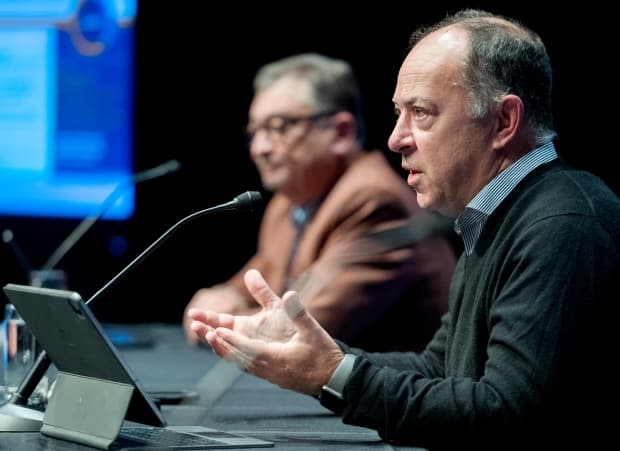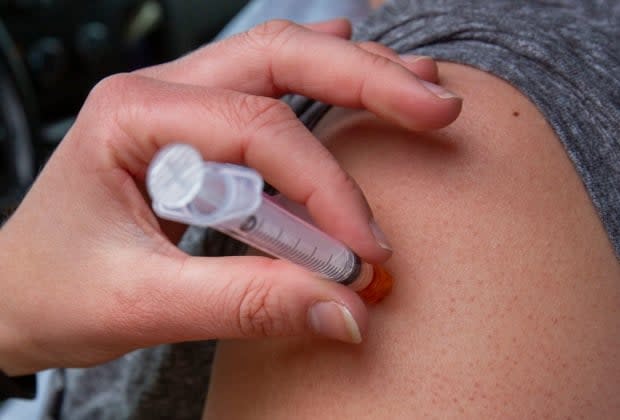Quebec to offer 3rd dose of COVID-19 vaccine to people living in long-term care, seniors' homes

Quebec Health Minister Christian Dubé announced on Tuesday that public health authorities in the province are recommending a third dose of the COVID-19 vaccine for people living in long-term care facilities (CHSLDs), private seniors' homes (RPAs) and family-type or intermediate residences (RI-RTF).
He said that the province is not currently recommending that people living outside these kinds of facilities get a third dose.
"We will wait for the recommendations of our experts for other age groups and people living at home, depending on the evolution of the situation," Dubé said.
Dubé said the recommended interval to wait before getting a third dose is six months, which he said won't be a problem as most people in this category were vaccinated in March or April.
He said that the booster doses are planned to roll out at the same time as the annual influenza vaccine campaign and will begin in CHSLDs in late October and then move on to RPAs and RI-RTFs in November.
He said the decision is being made in response to the increasing number of cases in these facilities.
"Despite an excellent rate of vaccination, over the past month, we went from approximately 10 active cases at the beginning of September, and now we have 140 active cases in our CHSLDs, RPAs and RI-RTFs," said Dubé.

He said data has shown that "the elderly and people who are vulnerable, people with chronic illnesses, react less well to the vaccine over time."
"Given that there is no negative effect to administering a booster, we will proceed with this vaccination," he said.
Dubé said that the booster is a preventive measure and will affect 220,000 people in the province: 40,000 in CHSLDs, 140,000 in RPAs and another 40,000 in RI-RTFs.
The province's public health director, Dr. Horacio Arruda, made an administrative decision to start giving out doses to populations in those three settings based on recommendations from Quebec's immunization committee.
U.S. goes ahead with boosters for people 65+
The announcement comes one day after U.S. President Joe Biden, 78, publicly received a booster shot.
The U.S. Centers for Disease Control and Prevention and the Food and Drug Administration have recommended a third dose of the Pfizer-BioNTech vaccine for Americans 65 and older and approved them for others with pre-existing medical conditions or high-risk work environments.
But the aggressive American push for boosters, before many poorer nations have been able to provide even a first dose for their most vulnerable populations, has drawn the ire of the World Health Organization and some aid groups, which have called on the U.S. to pause third shots to free up supply for the global vaccination effort.
WATCH | Biden fields questions while getting booster:
Speaking on Tuesday, Dubé said that Quebec is not currently following America's lead because the epidemiological situation in the province is different. The U.S. imposed an interval of only 28 days between doses compared to Canada's delay of up to four months, which may have limited the effect, he said.
"If we do [the second dose] too soon, we lose the effect of the second dose," said Dubé.
"Data says they have to revaccinate those people because that interval was too low."
Responding to a question about the ethics of giving out a third dose when some countries don't have enough supply to vaccinate their populations, Arruda said that this concern does play into the government's decision-making.
He said that for now, it's only a small portion of people who are the most vulnerable who will be receiving a booster.
"We're not giving the dose to everybody," he said.
Beverly Spanier, a resident at the Maimonides Geriatric Centre in Montreal, told CBC News she welcomes the idea of getting a booster shot, especially after someone in her residence tested positive for COVID-19 last week.
"I think it's a very good idea," said Spanier, who has already had COVID-19. "I worry that if we start now to have illnesses again, and the shots that we've been given have worn off, that we'll be in trouble."
Spanier also worries about transmission between residents who are not following the health measures imposed by the government.
"I see far too many of our residents in the hallway without masks, together without social distancing," she said. "I think we need inspectors to come through and check these residences."

Dr. Sophie Zhang, who oversees 15 long-term care centres within the territory of the regional health authority for Montreal Centre-South, said she sees the value in administering a booster shot to people in care.
"There is data that shows that the third dose could decrease infections and decrease the severity of illness, so in that sense it's probably an extra protection," said Zhang.
She said many of the residents living in public or private seniors' homes may already be disadvantaged because of their age and pre-existing health conditions.
"Elderly people have a weaker immune response, and also because of their multiple illnesses, we do know that they don't respond as well to vaccine doses, compared to the general population. And there are a few small outbreaks that are starting to appear here and there, so I do see the reasons behind this decision," she said.
Zhang added that right now, she thinks it's too early to start thinking about giving out booster shots for everyone else.
At the end of August, Quebec's immunization committee (CIQ) announced it was recommending a third dose of a COVID-19 vaccine for people who are immunocompromised or undergoing dialysis.
The province's public health research institute, the INSPQ, says an additional dose should be considered as a reinforcement of the basic vaccination, as the second dose is sometimes not sufficient.
That measure affected about one to two per cent of the population, including people who have had an organ transplant or who are receiving chemotherapy treatment.

 Yahoo Movies
Yahoo Movies 